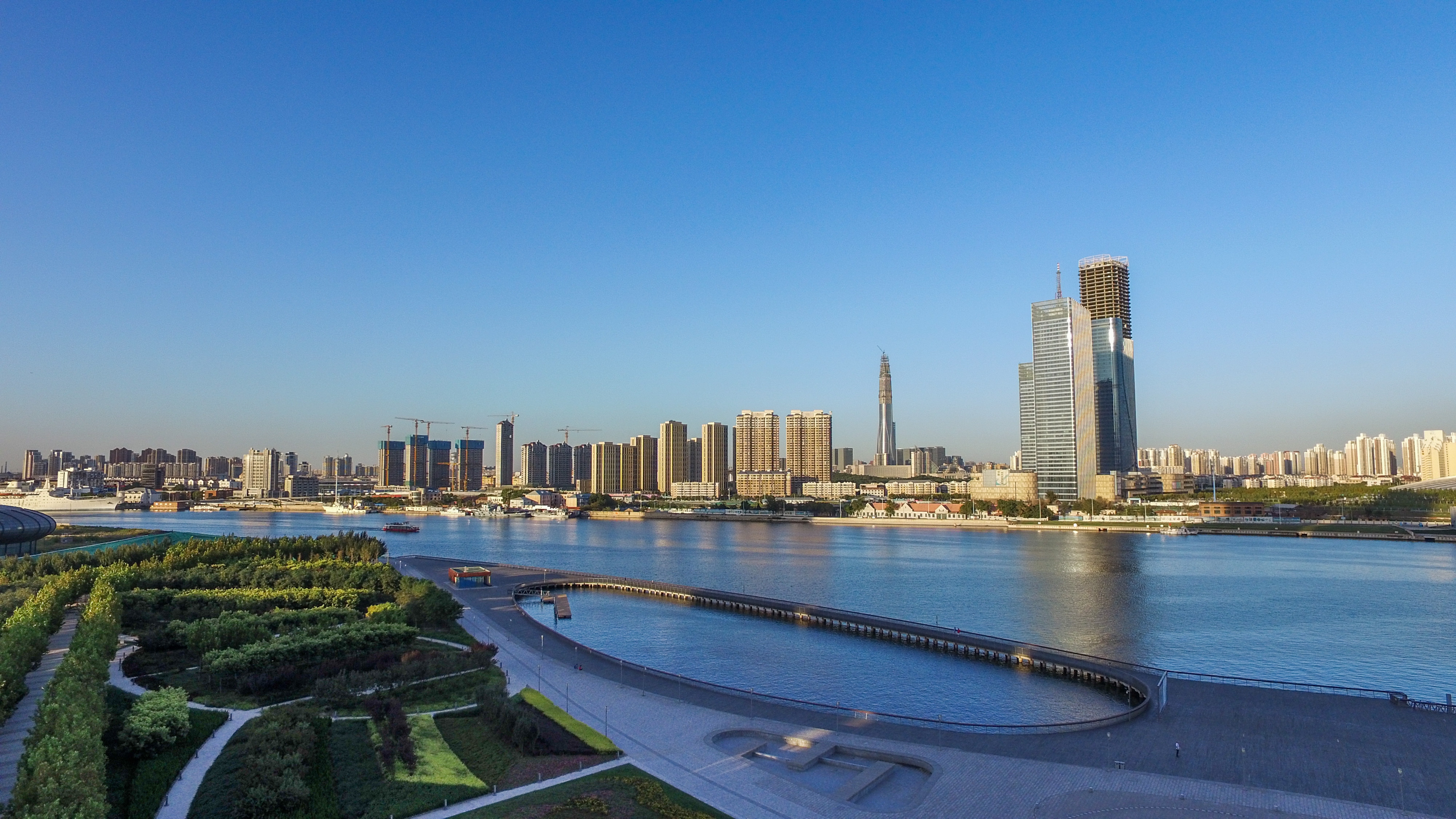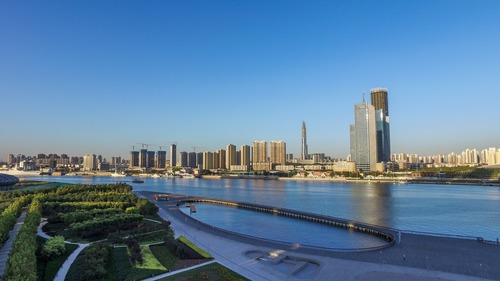
The landscape of Yujiapu Finance District is seen at Binhai New Area of the China (Tianjin) Pilot Free Trade Zone (FTZ) in north China's Tianjin Municipality, Sept. 17, 2017. (Xinhua/Bai Yu)
BEIJING, July 5 (Xinhua) -- China stepped up efforts to expand institutional opening up as five eligible free trade zones (FTZs) and one free trade port (FTP) are earmarked to pilot alignment of rules with comparable high-standard international ones.
On June 29, the State Council, China's cabinet, issued a circular which contains measures of six aspects to allow FTZs in Shanghai, Guangdong, Tianjin, Fujian and Beijing and Hainan FTP as pilot forerunners to align their rules with high-standard international economic and trade rules to deepen institutional opening up.
Industry experts said that focusing on goods trade, services trade, temporary entry of business personnel, digital trade, business environment and risk control, 33 detailed pilot measures proposed in the circular will help the pilot areas explore more paths to comprehensively deepen reform and broaden opening up.
In light of the importance of digital trade in developing trade of higher quality, the circular also outlines measures on enriching online consumption-related consumer rights and interests protection rules and requiring public departments concerned and their staff not to impose transferring or acquiring source codes of mass market software on their owners as conditions for import sales.
Zheng Wei, research associate with China Outsourcing Institute, noted that these measures involve wider opening up in goods trade, services trade and digital trade and also make adjustment and arrangement in customs clearance and duty exemption, covering all the fields and processes of international trade and marking an important step to advance China's institutional opening up in the new era.
-- Unimpeded goods trade driven by policy innovation
After becoming the world's largest trading nation since 2020 when total foreign trade rose to 5.3 trillion U.S. dollars, China has accelerated its pace to further vitalize trade to grow as a strong trade nation.
Goods trade, a dominant part of international trade and also one of the fastest engines that drove forward China's economy in the past decades, is undoubtedly highlighted in the circular which proposes to foster innovative development of goods trade.
With five measures directly relative to facilitation to customs clearance, the circular stresses further improving the transparency of customs clearance time and reducing customs clearance costs.
It comes up with multiple measures in this regard, including supporting the six eligible areas to pilot import of remanufactured products in key industries, exempting duties for aircraft and ships that are re-transported into the Hainan FTP after being sent overseas for repair, and applying supplier's declaration of conformity in standards related to import of IT equipment.
Chen Chunjiang, assistant minister of commerce, said on a previous news briefing of the State Council that boosting goods trade innovation and development stands always as one of the priorities for institutional innovation of FTZs and FTP and the rules alignment will bring practical benefits to related enterprises and consumers as it proposes pilot import of remanufactured products and pilot duty exemption for re-entering of ships and aircraft transported overseas for repair.
-- Better business environment with easy entry of biz personnel
Generally, facilitation to temporary entry of business personnel represents both requirement of high-standard international economic and trade rules and China's concrete measures to further expand opening up.
Taking into consideration of market entities' suggestions and needs, the circular includes innovative measures of two aspects to facilitate temporary entry of business personnel.
First of all, spouses and family members accompanying foreign experts internally relocated to China by their foreign-funded enterprises established in the five FTZs and Hainan FTP are permitted in the circular to enjoy the same entry, stay and residence periods with the foreign experts, in a bid to provide them with a relaxed and comfortable life in China.
Secondly, for senior management staff of foreign firms mulling establishing branches or subsidiaries in the pilot areas, the circular proposes to extend the validity period of these personnel's temporary entry and stay period in China to two years and allow the accompanying spouses and family members to enjoy the same entry, stay and residence periods.
Nie Pingxiang, researcher with Chinese Academy of International Trade and Economic Cooperation said such measures on temporary entry of foreign business personnel of multinational companies will bring more convenience to their work in China and create better business environment for development of foreign-funded companies in China.
-- More convenient cross-border capital flow to optimize trade and investment facilitation
As an integral pillar to support alignment with high-standard international economic and trade rules in the five FTZs and Hainan FTP, finance-related measures also appear in the circular to improve facilitation to foreign investors' cross-border investment in China and diversify the outbound investment channels of enterprises and individuals in the pilot areas.
Industry experts introduced that the circular's permission of free inward and outward remittance without delay of all real, rules-compliant and foreign investors' investment-related "transfers" is in line with requirements of China's foreign investment law and its implementation rules.
Its measures such as allowing foreign-funded financial institutions to carry out the same type of new financial services as their Chinese counterparts, and related businesses and individuals to purchase pursuant to relevant laws and regulations certain types of overseas financial services, and reducing the approval time for related financial services are expected to provide a fairer, stabler, more open and transparent competition environment for both Chinese and foreign financial service providers in China.
Wang Xin, head with the Research Bureau of the People's Bank of China (PBOC), said that the Chinese central bank will work with related departments to enhance implementation of these measures and support from the perspective of cross-border capital flow management companies and individuals in the pilot areas to buy overseas financial services in accordance with related laws and rules.
An expert with Deutsche Bank held that the bank is expecting to better serve clients through cross-border cash management, trade service, foreign exchange management and other banking solutions that seek goods trade innovation and services trade facilitation.
In the future, China's Ministry of Commerce (MOC) will work together with related departments to speed up implementation of the pilot measures and compile an explicit timetable for the rules alignment.
For those that need indeed guiding opinions, measures, detailed rules and plans, all of them will be completed within the following 12 months and one year later, systemic summary and appraisal of the pilot measures will be conducted to replicate effective and risk controllable pilot measures in more FTZs, according to MOC.
Advancing the rules alignment reform in pilot FTZs and Hainan FTP under the principle of piloting, surveying, summarizing and application at the same pace mirrors China's pragmatic attitude in policy formulating and will maximumly unleash the potential of these pilot policies and benefit businesses in a real sense, Zheng Wei added. (Edited by Duan Jing with Xinhua Silk Road, duanjing@xinhua.org)




 A single purchase
A single purchase









